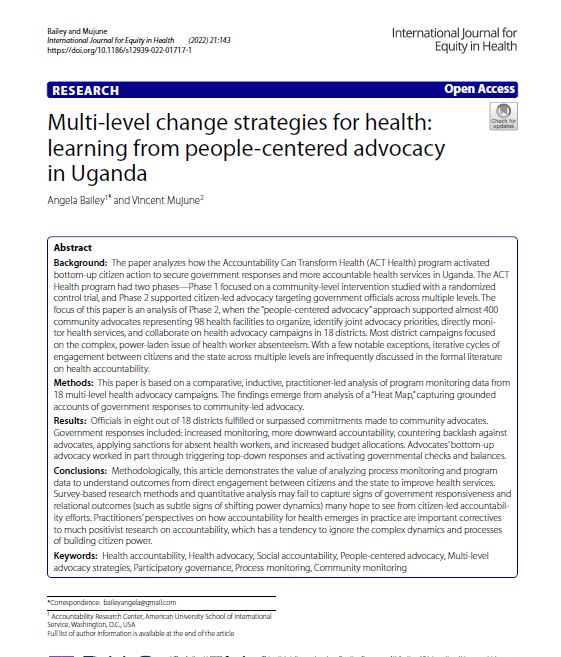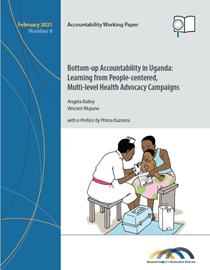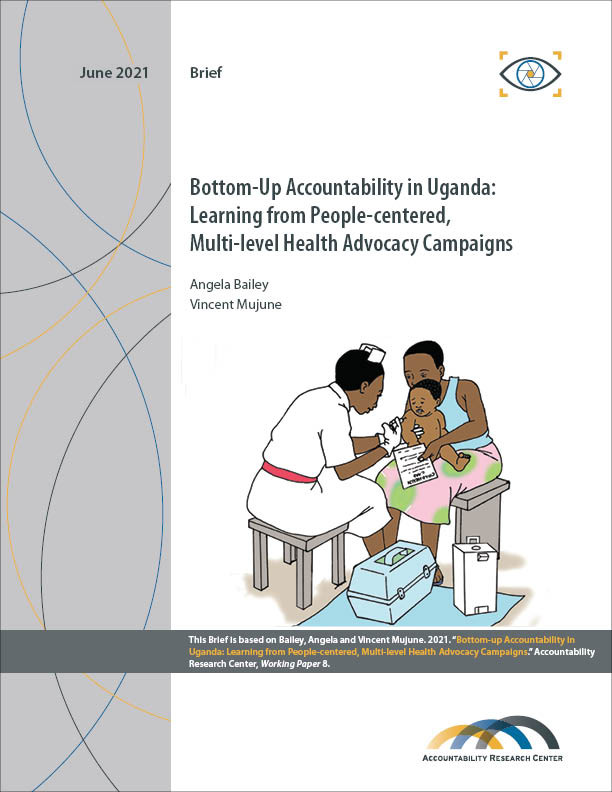
Multi-Level Change Strategies for Health: Learning from People-Centred Advocacy in Uganda
Date: September 2022
Author(s): Angela Bailey and Vincent Mujune
Publication type: Scholarly journal article
Published by: International Journal for Equity in Health
This article analyzes how the Accountability Can Transform Health (ACT Health) program activated bottom-up citizen action to secure government responses and more accountable health services in Uganda.
This paper analyzes the “people-centered advocacy” approach taken by the program in its second phase. This supported almost 400 community advocates representing 98 health facilities to organize, identify joint advocacy priorities, directly monitor health services, and collaborate on health advocacy campaigns in 18 districts. Most district campaigns focused on the complex, power-laden issue of health worker absenteeism.
This paper is based on a comparative, inductive, practitioner-led analysis of program monitoring data from 18 multi-level health advocacy campaigns. The findings emerge from analysis of a “Heat Map,” capturing grounded accounts of government responses to community-led advocacy.
Officials in eight out of 18 districts fulfilled or surpassed commitments made to community advocates. Government responses included: increased monitoring, more downward accountability, countering backlash against advocates, applying sanctions for absent health workers, and increased budget allocations. Advocates’ bottom-up advocacy worked in part through triggering top-down responses and activating governmental checks and balances.
The article demonstrates the value of analyzing process monitoring and program data to understand outcomes from direct engagement between citizens and the state to improve health services. Survey-based research methods and quantitative analysis may fail to capture signs of government responsiveness and relational outcomes (such as subtle signs of shifting power dynamics) many hope to see from citizen-led accountability efforts.
Practitioners’ perspectives on how accountability for health emerges in practice are important correctives to much positivist research on accountability, which has a tendency to ignore the complex dynamics and processes of building citizen power.
Angela Bailey
Angela began working at the Accountability Research Center (ARC), in August 2016, and served as Managing Director until April 2022. Prior to joining ARC, Angela worked for international NGOs in various capacities in Liberia and Uganda. From April 2014 to June 2016, Angela worked with GOAL as program director of the Accountability Can Transform Health (ACT Health) program in Uganda. She holds a Master’s in International Affairs from Columbia University’s School of International and Public Affairs.
Vincent Mujune
Vincent led GOAL’s people-centered health advocacy work in Uganda from May 2016 to December 2020. He supported community-led processes using participatory evidence-generation and analysis methods to engage affected communities, build their capacities and strengthen the influence of marginalized households on the health system. Vincent is a member of Uganda’s Civil Society Budget Advocacy Group and has trained civil society actors on people-centered advocacy in Sri Lanka, Malawi, and Sierra Leone.


